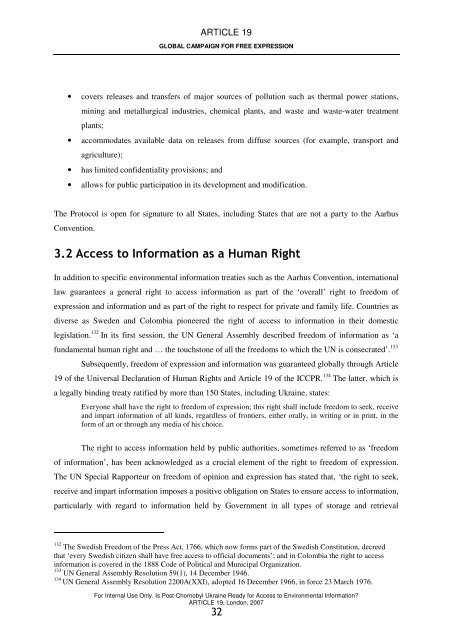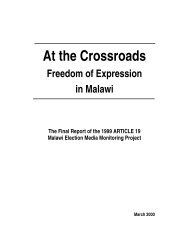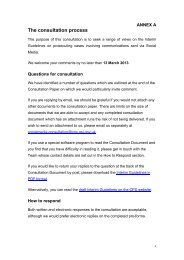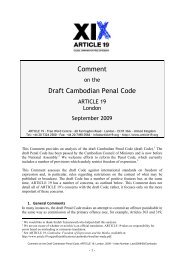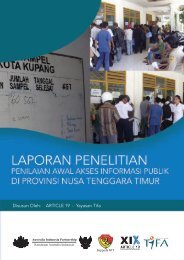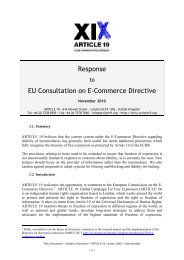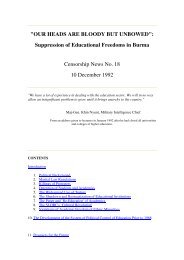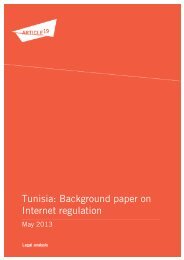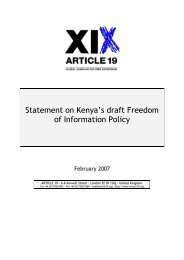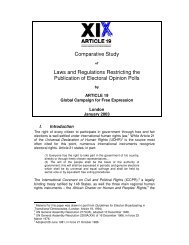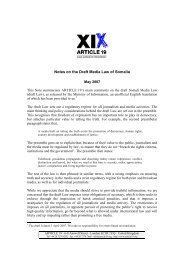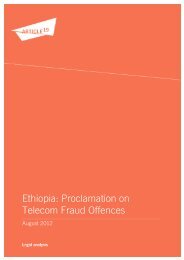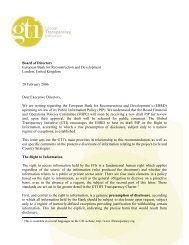ARTICLE <strong>19</strong>GLOBAL CAMPAIGN <strong>FOR</strong> FREE EXPRESSION• covers releases and transfers of major sources of pollution such as thermal power stations,mining and metallurgical industries, chemical plants, and waste and waste-water treatmentplants;• accommodates available data on releases from diffuse sources (for example, transport andagriculture);• has limited confidentiality provisions; and• allows for public participation in its development and modification.The Protocol is open for signature to all States, including States that are not a party to the AarhusConvention.3,&" 0 %" .In addition to specific environmental information treaties such as the Aarhus Convention, internationallaw guarantees a general right to access information as part of the ‘overall’ right to freedom ofexpression and information and as part of the right to respect for private and family life. Countries asdiverse as Sweden and Colombia pioneered the right of access to information in their domesticlegislation. 132 In its first session, the UN General Assembly described freedom of information as ‘afundamental human right and … the touchstone of all the freedoms to which the UN is consecrated’. 133Subsequently, freedom of expression and information was guaranteed globally through <strong>Article</strong><strong>19</strong> of the Universal Declaration of Human Rights and <strong>Article</strong> <strong>19</strong> of the ICCPR. 134 The latter, which isa legally binding treaty ratified by more than 150 States, including Ukraine, states:Everyone shall have the right to freedom of expression; this right shall include freedom to seek, receiveand impart information of all kinds, regardless of frontiers, either orally, in writing or in print, in theform of art or through any media of his choice.The right to access information held by public authorities, sometimes referred to as ‘freedomof information’, has been acknowledged as a crucial element of the right to freedom of expression.The UN Special Rapporteur on freedom of opinion and expression has stated that, ‘the right to seek,receive and impart information imposes a positive obligation on States to ensure access to information,particularly with regard to information held by Government in all types of storage and retrieval132 The Swedish Freedom of the Press Act, 1766, which now forms part of the Swedish Constitution, decreedthat ‘every Swedish citizen shall have free access to official documents’; and in Colombia the right to accessinformation is covered in the 1888 Code of Political and Municipal Organization.133 UN General Assembly Resolution 59(1), 14 December <strong>19</strong>46.134UN General Assembly Resolution 2200A(XXI), adopted 16 December <strong>19</strong>66, in force 23 March <strong>19</strong>76.For Internal Use Only. Is Post-Chornobyl Ukraine Ready for Access to Environmental Information?ARTICLE <strong>19</strong>, London, 2007"
ARTICLE <strong>19</strong>GLOBAL CAMPAIGN <strong>FOR</strong> FREE EXPRESSIONsystems.’ 135 The Special Rapporteur developed his commentary on freedom of information in his 2000annual report to the Commission on Human Rights, noting the fundamental importance of this rightnot only to democracy and freedom, but also to the right to public participation and the realisation ofthe right to development. 136 The UN Human Rights Committee, the body established to superviseimplementation of the ICCPR, has also frequently urged States to enact freedom of informationlegislation. 137 The Inter-American Court of Human Rights recently stated unambiguously that freedomof expression, which includes the right to seek and receive information, ‘protects the right of everyperson to request access to the information under the control of the State’. 138Under the ECHR, 139 the regional human rights treaty ratified by Ukraine, the right to accessenvironmental information is enforced primarily through <strong>Article</strong> 8, which protects the right to privateand family life and peaceful enjoyment of the home. 140 The European Court of Human Rights, whichoversees compliance with the ECHR, has ruled that environmental pollution will generally affectpeople’s well-being and is therefore relevant to the protection of private and family life, under <strong>Article</strong>8. For example, in Guerra and Ors. v. Italy, 141 the Court ruled that the failure of the authorities toprovide information concerning pollution caused by a factory near the applicants’ home violated theirright to private and family life. Although there had been no active State interference with theapplicants’ right to respect for private and family life, the Court ruled that <strong>Article</strong> 8 imposes a positiveobligation on the State to ensure the enjoyment of that right, which includes the obligation to provideinformation. Two years later, in McGinley and Egan v. The United Kingdom, 142 the Court followed itsdecision in Guerra and Ors. v. Italy and confirmed that the ECHR guaranteed a right of access to therelevant information. 143 In the McGinley and Egan case the applicants had been exposed to radiation135 Report of the Special Rapporteur, Promotion and Protection of the Right to Freedom of Opinion andExpression, UN Doc. E/CN.4/<strong>19</strong>98/40, 28 January <strong>19</strong>98, para. 14.136Report of the Special Rapporteur, Promotion and Protection of the Right to Freedom of Opinion andExpression, UN Doc. E/CN.4/2000/63, 18 January 2000, para. 42.137 See, for example, its Concluding Observations on Ireland (UN Doc. CCPR/C/79/Add.21, 28 July <strong>19</strong>93); andon Azerbaijan (UN Doc. A/49/40, 27 July <strong>19</strong>94).138 Claude Reyes and Others v. Chile, <strong>19</strong> September 2006, Series C No. 151, para. 77 (Inter-American Court ofHuman Rights). Unofficial translation from the Spanish judgement.139Adopted 4 November <strong>19</strong>50, in force 3 September <strong>19</strong>53.140 Although early developments placed the right to access environmental information under <strong>Article</strong> 10, afreedom of expression provision similar to <strong>Article</strong> <strong>19</strong> of the ICCPR, jurisprudential quirks have resulted in itbeing placed under <strong>Article</strong> 8.141 Guerra and Ors. v. Italy, <strong>19</strong> February <strong>19</strong>98, Application No. 14967/89 (European Court of Human Rights).142 McGinley and Egan v. The United Kingdom, 28 January 2000, Application Nos. 21825/93 and 23414/94(European Court of Human Rights).143 The Court did not find a violation. However, the respondent government had complied with its obligations byproviding a process by which access to the relevant information could be obtained, but which the applicants hadnot used.For Internal Use Only. Is Post-Chornobyl Ukraine Ready for Access to Environmental Information?ARTICLE <strong>19</strong>, London, 2007""


